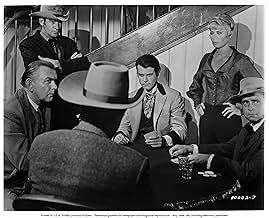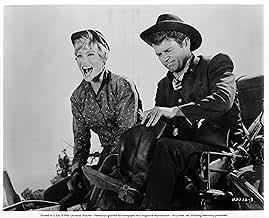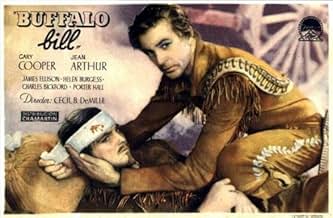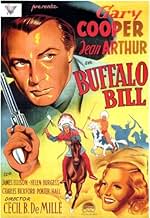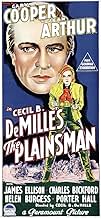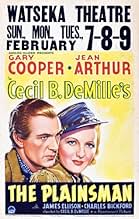VALUTAZIONE IMDb
6,8/10
2490
LA TUA VALUTAZIONE
Aggiungi una trama nella tua linguaWild Bill Hickok and Buffalo Bill Cody attempt to stop an Indian uprising that was started by white gun-runners.Wild Bill Hickok and Buffalo Bill Cody attempt to stop an Indian uprising that was started by white gun-runners.Wild Bill Hickok and Buffalo Bill Cody attempt to stop an Indian uprising that was started by white gun-runners.
Fred Kohler
- Jake - A Teamster
- (as Fred Kohler Sr.)
Pat Moriarity
- Sgt. McGinnis
- (as Pat Moriarty)
Trama
Lo sapevi?
- QuizJohn Wayne very much wanted the role of Wild Bill Hickok, which he felt certain would make him a star, but director Cecil B. DeMille wanted Gary Cooper instead.
- BlooperOn the evening of Lincoln's assassination Van Ellyn and his associates are discussing the supposedly then current John Soule editorial, "Go West, Young Man." Lincoln was murdered in 1865. Soule wrote that famous line in 1851.
- Citazioni
Calamity Jane: Tip your hat when you speak to a lady!
Wild Bill Hickok: I will... when I speak to a lady.
- Versioni alternativeThe UK DVD is cut by 2 secs to remove a horsefall.
- ConnessioniFeatured in The Hollywood Collection: Anthony Quinn an Original (1990)
- Colonne sonoreWhen Johnny Comes Marching Home
(1863) (uncredited)
Written by Louis Lambert
Played as background music for the first scene, Washington, D.C.
Recensione in evidenza
After the failure of "The Crusades" at the box office, Cecil B. DeMille stopped doing films about non-American history. His films for the next thirteen years were about our history from Jean Lafitte to World War II (Dr. Wassell). The first in order of production was this film, starring Gary Cooper as Wild Bill Hickok, with Jean Arthur as Calamity Jane. James Ellison was Buffalo Bill, John Miljan (not a villain as usual) was General George A. Custer, and Anthony Quinn was one of the Indians who fought at Little Big Horn. The villains were led by Charles Bickford (selling arms to the Indians) and Porter Hall as Jack McCall (who killed Wild Bill Hickok).
Basically the film takes up the history of the U.S. after the Civil War. Lincoln is shown at the start talking about what is the next step now that Lee has surrendered. Lincoln talks about the need to secure the west (more about this point later). Then he announces he has to go to the theater. That April 14th must have been very busy for Abe - in "Virginia City" he grants a pardon to Errol Flynn at the request of Miriam Hopkins on the same date.
Actually, while Lincoln was concerned about the West, his immediate thoughts on the last day of his Presidency were about reunifying the former Confederate states and it's citizens into the Union as soon as possible. It was Reconstruction that occupied his attention, not the west (except for the problems of Maximillian and his French controlled forces in Mexico against Juarez). But he had been involved in actual problems with the West. In 1862 he sent disgraced General John Pope, the loser at Second Manassas, to Minnesota to put down a serious Indian war by the Sioux (the subject of McKinley Kantor's novel, "Sprit Lake". Pope, incompetent against Lee and Jackson, turned out to be quite effective here, and the revolt was smashed.
However, with all Lincoln's actual attention to western problems, it is doubtful that he says (as Cooper repeats at least once), "The frontier should be secure." There is nothing to say he could not have said it, but it is hardly a profound pronouncement by a leading statesman. Like saying, Teddy Roosevelt said, "Eat a good breakfast every morning for your health." It is not a profound statement of policy. It is, at best, a statement of recognizable fact. Cooper turning it into a minor mantra, like Lincoln's version of the Monroe Doctrine, is ridiculous...typical of the way DeMille's scripts have really bad errors of common sense in them.
However, this is not a ruinous mistake. "The Plainsman" is an adventure film, and as such it has the full benefit of DeMille the film creator of spectacle. As such it is well worth watching. But not as a textbook on Lincoln's political ideas or his quotable legacy.
Basically the film takes up the history of the U.S. after the Civil War. Lincoln is shown at the start talking about what is the next step now that Lee has surrendered. Lincoln talks about the need to secure the west (more about this point later). Then he announces he has to go to the theater. That April 14th must have been very busy for Abe - in "Virginia City" he grants a pardon to Errol Flynn at the request of Miriam Hopkins on the same date.
Actually, while Lincoln was concerned about the West, his immediate thoughts on the last day of his Presidency were about reunifying the former Confederate states and it's citizens into the Union as soon as possible. It was Reconstruction that occupied his attention, not the west (except for the problems of Maximillian and his French controlled forces in Mexico against Juarez). But he had been involved in actual problems with the West. In 1862 he sent disgraced General John Pope, the loser at Second Manassas, to Minnesota to put down a serious Indian war by the Sioux (the subject of McKinley Kantor's novel, "Sprit Lake". Pope, incompetent against Lee and Jackson, turned out to be quite effective here, and the revolt was smashed.
However, with all Lincoln's actual attention to western problems, it is doubtful that he says (as Cooper repeats at least once), "The frontier should be secure." There is nothing to say he could not have said it, but it is hardly a profound pronouncement by a leading statesman. Like saying, Teddy Roosevelt said, "Eat a good breakfast every morning for your health." It is not a profound statement of policy. It is, at best, a statement of recognizable fact. Cooper turning it into a minor mantra, like Lincoln's version of the Monroe Doctrine, is ridiculous...typical of the way DeMille's scripts have really bad errors of common sense in them.
However, this is not a ruinous mistake. "The Plainsman" is an adventure film, and as such it has the full benefit of DeMille the film creator of spectacle. As such it is well worth watching. But not as a textbook on Lincoln's political ideas or his quotable legacy.
- theowinthrop
- 4 mar 2005
- Permalink
I più visti
Accedi per valutare e creare un elenco di titoli salvati per ottenere consigli personalizzati
- How long is The Plainsman?Powered by Alexa
Dettagli
Botteghino
- Budget
- 1.000.000 USD (previsto)
- Tempo di esecuzione1 ora 53 minuti
- Colore
- Proporzioni
- 1.37 : 1
Contribuisci a questa pagina
Suggerisci una modifica o aggiungi i contenuti mancanti



